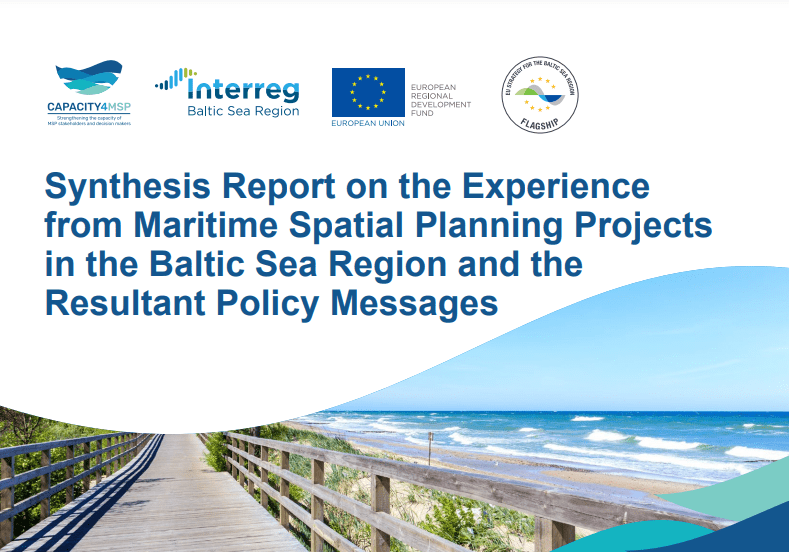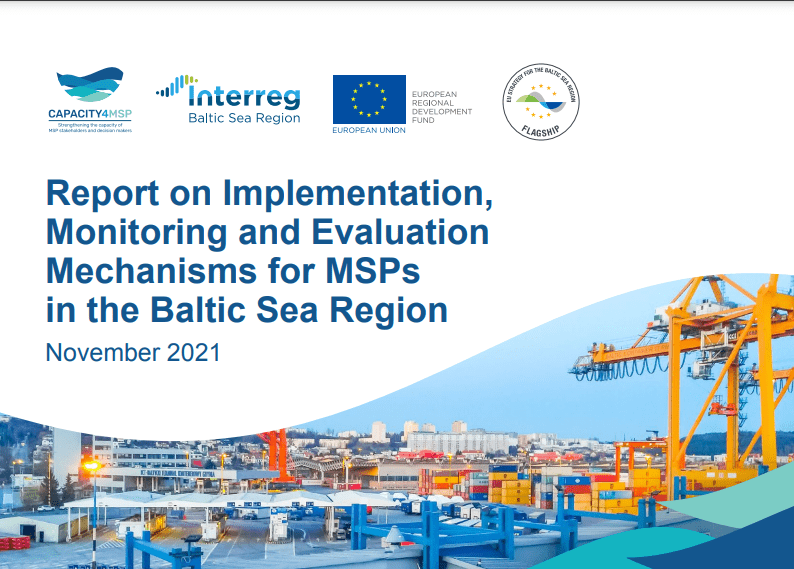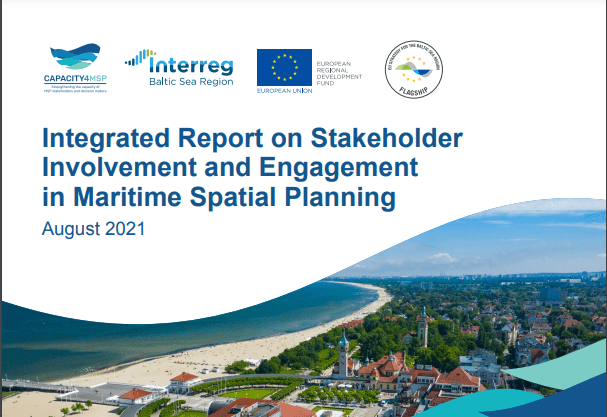Capacity4MSP
Why Capacity4MSP?
In the last decade, a significant progress has been made in building cooperation networks and creating a strong policy background for maritime spatial planning (MSP) in the Baltic Sea region. Currently, nearly all countries around the Baltic Sea work on their maritime plans, which makes our region a front-runner in Europe and the world. The challenge, however, remains to harmonise national maritime spatial plans, implement, monitor and to evaluate them.
What's the platform about?
Capacity4MSP created a practically oriented and interactive collaboration platform for knowledge exchange and an intensified dialogue between MSP practitioners, policy- and decision makers and other stakeholders. Capacity4MSP built on the results of the current and recently completed MSP projects and ongoing MSP processes in the Baltic Sea region. It increased the visibility and impact of projects and built up on potential synergies. The platform deepened and widened the gained know-how across various sectors and governance levels by synthesising, amplifying and transferring the project outcomes to new practical solutions.
Projects represented in the platform:
- Interreg Baltic Sea Region: Baltic LINes | Baltic RIM | Baltic InteGrid | Baltic Blue Growth | Land-Sea-Act | Blue Platform
- Horizon 2020: MUSES
- BONUS: BASMATI | BaltSpace
- European Maritime and Fisheries Fund: Baltic SCOPE & Pan Baltic Scope
- Interreg South Baltic: SeaPlanSpace
Budgets
in numbers
-
1.09MillionTotal
-
0.73MillionErdf
-
0.15MillionEni + Russia
-
0.00MillionNorway
Achievements
Gathering the know-how in one place
The Capacity4MSP platform synthesised the knowledge gained in a dozen of maritime spatial planning (MSP) projects and practices within and beyond the Baltic Sea Region (BSR) co-funded by Interreg, Horizon 2020 and European Maritime and Fisheries Fund. Based on this synthesis, the partners produced a report in order to inform and help national MSP decision- and policy-makers review the implementation of the existing MSP frameworks. The report proposed synergies between recurring important themes, but also criteria and indicators to assess the process, content and performance of the maritime spatial plans.
Speaking with one voice about maritime spatial planning
Moreover, the partners brought together MSP authorities, planners and actors from specific thematic sectors using the marine space to help harmonise MSP in the region. Together, they developed joint policy messages.
Complementarily to already existing HELCOM – VASAB working group, Capacity4MSP established a lasting mechanism to support more informal exchange among maritime spatial planners in the region through the Planners Forum. The Planners Forum will now regularly be held at least twice a year.
Impact on pan-Baltic cooperation
The project platform results helped shape new strategic policy documents of VASAB and HELCOM-VASAB cooperation. These materials also feed into the work and inspired the policy area Spatial Planning within the EU Strategy for the Baltic Sea region, that is led by the Secretariats of pan-Baltic organisations VASAB and HELCOM. Project results contributed to setting the future agenda for the MSP in the region, particularly, to the new Regional Maritime Spatial Planning Roadmap 2021-2030, the HELCOM-VASAB MSP working group work plan 2022-2024, as well as update of the VASAB Long Term Perspective.
Outputs
Report on the experience from maritime spatial planning (MSP) projects in the Baltic Sea region

Report on Implementation and Monitoring & Evaluation Mechanisms of MSPs

Report on MSP stakeholder involvement and engagement in maritime spatial planning

Project Stories
-
11.05.2021
How water-smart ideas make the Baltic Sea region thrive
From a rich marine life to beautiful vacation places, the Baltic Sea offers numerous resources that can be exploited to boost the economic growth of the region without harming its ecosystem. Interreg Baltic Sea Region funded multiple cooperation projects that have contributed to a sustainable and innovative blue economy. Good and successful examples of smart blue initiatives include ALLIANCE, Baltic Blue Growth, Capacity4MSP and Blue Platform.Read full story -
29.03.2021
Cooperation as the key to a climate-neutral Baltic Sea region
A common challenge for the countries in the Baltic Sea region is how to produce green and climate-neutral energy. In fact, as much as 75% of the EU greenhouse gas emissions still come from energy use and production. Cooperation and sharing good practices in Interreg projects, such as LowTEMP, Baltic Integrid and Area 21, can be a game-changer in accelerating the energy transition in the region.Read full story -
30.09.2020
Great project pictures that tell great Interreg stories!
More than seventy pictures competed in the Interreg Baltic Sea Region photo competition. Which projects were the best in illustrating transnational cooperation, grasping the essence of a project and its result, and presenting the 30th anniversary of Interreg? Congratulations to the teams of BalticRIM, RESQU2, Baltic Game Industry, EcoDesign Circle and GoSmart BSR!Read full story -
06.01.2020
Interview: Exploiting offshore wind energy in the Baltic Sea region
The Baltic Sea region has great potential to generate offshore wind energy, but offshore grid development poses a major obstacle. The Interreg project Baltic InteGrid looked into meshed electricity grids, i.e. interconnecting offshore wind farms in order to achieve cost advantages and make more efficient use of maritime space. Thilo Krupp from the German Offshore Wind Energy Foundation explains results and experiences from the project.Read full story -
15.07.2019
Coherent planning of shipping and offshore energy across borders with Baltic LINes
The Baltic Sea experiences an increasing demand for coherent spatial planning in order to bring shipping routes and offshore renewable energy infrastructure together. Project partners from nine countries worked across borders to tackle the challenge of scarce space available and competing economic interests of the different sectors active in and around the Baltic Sea in the Interreg project Baltic LINes.Read full story -
13.03.2018
Helping spatial planners see the cultural heritage of the sea
The Interreg project BalticRIM integrates maritime cultural heritage of the Baltic Sea into maritime spatial plans to safeguard it for the future. Matthias Maluck from the State Archaeological Department of Schleswig-Holstein explains what maritime cultural heritage is and why and how it should be preserved. BalticRIM frames cultural heritage of individual countries in a transnational perspective and thus delivers territorial cohesion.Read full story -
20.12.2016
Making legal requirement accessible to establish an environmentally friendly aquaculture in the baltic sea
Establishing environmentally friendly mussel aquaculture requires to follow necessary legal obligations in the EU. The project Baltic Blue Growth is making a concerted effort in explaining these requirements to its projects partners and others who are interested in pushing forward mussel aquaculture in the Baltic Sea.Read full story
Partners
State Regional Development Agency (VASAB)
- TownRīga
- RegionRīga
- CountryLatvia
- RepresentativeAlda Nikodemusa
- Phone
- E-Mail
- Web
SUCCEEDED by PP11 (01.10.2019) Maritime Institute in Gdańsk (MIG)
- TownGdansk
- RegionGdański
- CountryPoland
- RepresentativeJacek Zaucha
- Phone
- E-Mail
- Web
Aalborg University (AAU)
- TownCopenhagen SV
- RegionByen København
- CountryDenmark
- RepresentativeHenning Sten Hansen
- Phone
- E-Mail
- Web
Swedish Agency for Marine and Water Management (SwAM)
- TownGöteborg
- RegionVästra Götalands län
- CountrySweden
- RepresentativeThomas Johansson
- Phone
- E-Mail
- Web
Baltic Marine Environment Protection Commission, Helsinki Commission (HELCOM)
- TownHelsinki
- RegionHelsinki-Uusimaa
- CountryFinland
- RepresentativeRiina Kero
- Phone
- E-Mail
- Web
Ministry of Environmental Protection and Regional Development (MoEPRD)
- TownRīga
- RegionRīga
- CountryLatvia
- RepresentativeKristīne Kedo
- Phone
- E-Mail
- Web
Scientific and Research Institute of Maritime Spatial Planning Ermak NorthWest Limited liability company (ErmakNW)
- TownSt. Petersburg
- RegionCity of St. Petersburg
- Country
- RepresentativeLarisa Danilova
- Phone
- E-Mail
- Web
Submariner Network for Blue Growth EWIV
- TownBerlin
- RegionBerlin
- CountryGermany
- RepresentativeAngela Schultz-Zehden
- Phone
- E-Mail
- Web
Russian State Hydrometeorological University (RSHU)
- TownSaint-Petersburg
- RegionLeningrad Oblast
- Country
- RepresentativeAlexandra Ershova
- Phone
- E-Mail
- Web
Gdynia Maritime University (GMU)
- TownGdansk
- RegionGdański
- CountryPoland
- RepresentativeAgnieszka Pęksyk
- Phone
- E-Mail
- Web
-
Project managerInga JēkabsoneVASAB Secretariat
-
Legal representativeAigars UndzēnsState Regional Development Agency (VASAB)
-
Financial managerEgija StapkēvičaState Regional Development Agency (VASAB)
-
Communication managerLiene StrazdiņaState Regional Development Agency (VASAB)



